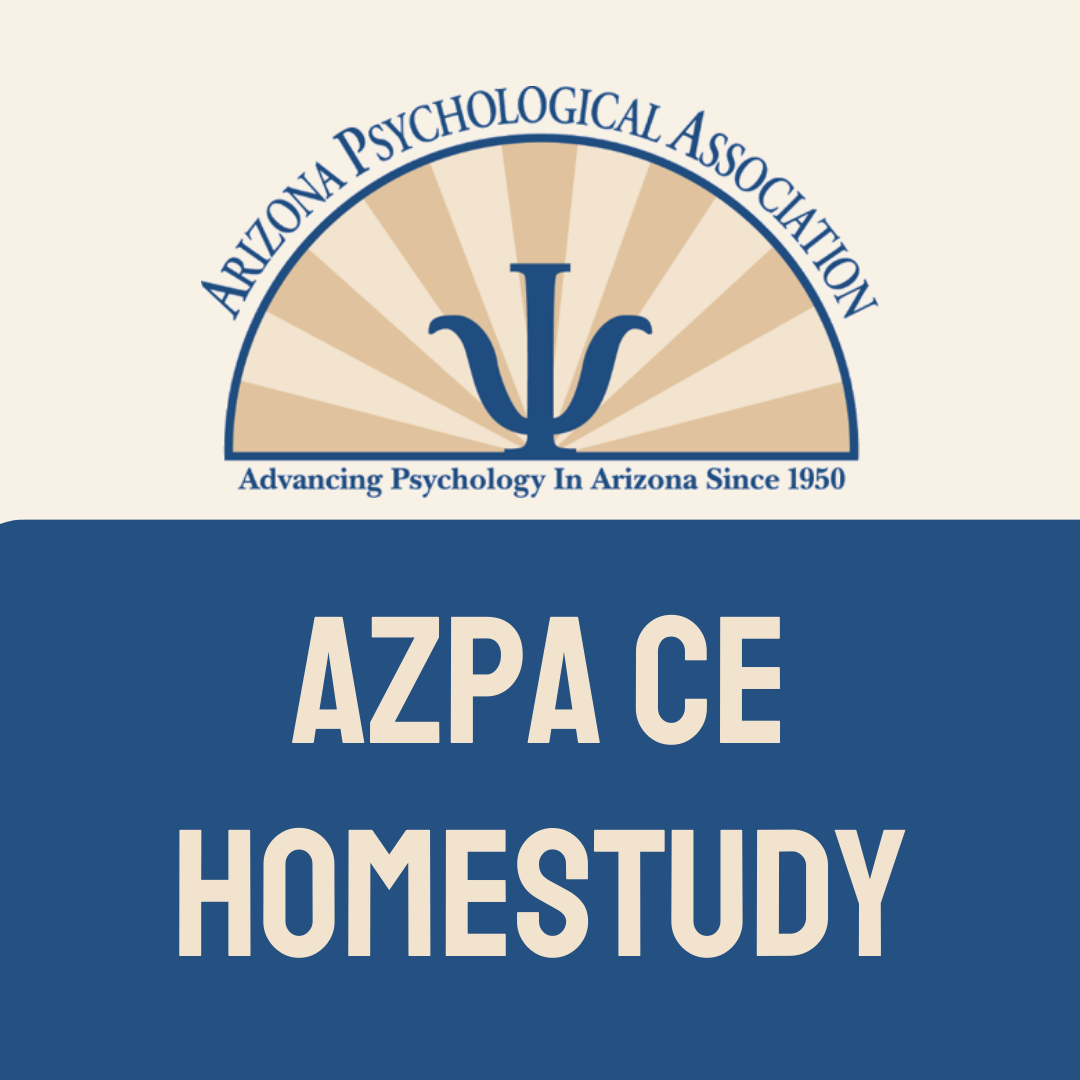| Arizona Psychological association |
CE Homestudy Programs
Below you will find a number of homestudy programs, presented by AzPA. To purchase a homestudy program, please follow the link below the program description. Please follow the prompts to submit payment. After payment is received, an AzPA representative will email the webinar recording and CE quiz to you. Please allow two business days processing time.
If you have any questions, please contact AzPA Coordinator, Jessica Painter at 480-675-9477 or jessica@azpa.org.
![]() The Arizona Psychological Association (AzPA) is approved by the American Psychological Association to sponsor continuing education for psychologists. AzPA maintains responsibility for these programs and their content.
The Arizona Psychological Association (AzPA) is approved by the American Psychological Association to sponsor continuing education for psychologists. AzPA maintains responsibility for these programs and their content.
CE Homestudy Pricing
| 1 Hour | 2 Hour | 4 Hour | |
| AzPA Full Member | $20 | $40 | $80 |
| AzPA Student/Postdoc/Retired Member | $7.50 | $15 | $30 |
| Non-member Professional | $40 | $70 | $140 |
| Non-member Student/Postdoc/Retired | $15 | $30 | $60 |
2025 CE Programs
Self-Care for Psychologists: A Mandatory Ethical Practice
Presented By: Stewart Cooper, PhD, ABPP
Recorded live on November 5, 2025
Program Description
The 2003 APA Ethical Principles of Psychologists and Code of Conduct included language alluding to the need for psychologists’ self-care. Standard 2.06 Personal Problems and Conflicts states “(a) Psychologists refrain from initiating an activity when they know or should know that there is a substantial likelihood that their personal problems will prevent them from performing their work-related activities in a competent manner. (b) When psychologists become aware of personal problems that may interfere with their performing work-related duties adequately, they take appropriate measures, such as obtaining professional consultation or assistance, and determine whether they should limit, suspend, or terminate their work-related duties.”
Since that time, and especially since the beginning of the pandemic, increased advocacy for the importance of psychologists’ self-care, given its impact on patient care, has emerged (e.g., Baker, 2003; Barnett et al, 2007; Barnett & Levine, 2024; Callan, Schwartz, & Arputhan, 2021; Norcross & VandeBos, 2018; Rupert & Dorociak, 2019; Wise & Reuman, 2019). The revised ethics code will likely contain a stronger mandate for psychologists’ self-care (personal observation as the APA Board of Directors liaison to ECTF as well as a liaison from APA Division 13 and the Committee for the Advancement of General Applied Psychology).
This presentation will be divided into three segments. The initial part will cover the post 2003 literature on psychologists’ self-care as an ethical mandate. This initial segment will include direct connection with DEI, integration with spirituality and culture, and the identification of best practices. Continuation of these connections with the four themes will also be part of the second segment of the presentation which will focus on the development of a culturally embedded personal self-care plan for the psychologist. The third and final part of the presentation will be outward facing emphasizing tools and techniques for psychologists to help their patients assess and develop a self-care/resilience building plan founded on cultural, DEI and spiritual frameworks. Our patient’s self-care plans may or may not have much overlap with our own personal self-care plans. Both need to be contextually and culturally embedded to enhance likelihood of their being of value and effective.
Program Level: Intermediate
Learning Objectives:
- Identify three reasons why developing a personal self-care plan is an ethical mandate for them.
- Identify three specific elements likely to be included in their self-care plan.
- List three tools or strategies to help their clients develop a self-care plan.
CE Credits: 1.00
-
 Self-Care for Psychologists: A Mandatory Ethical Practice (Licensed Psychologist)
$40.00$20.00 - Member price
Self-Care for Psychologists: A Mandatory Ethical Practice (Licensed Psychologist)
$40.00$20.00 - Member price -
 Self-Care for Psychologists: A Mandatory Ethical Practice (Student, Postdoc, Retired)
$15.00$7.50 - Member price
Self-Care for Psychologists: A Mandatory Ethical Practice (Student, Postdoc, Retired)
$15.00$7.50 - Member price
